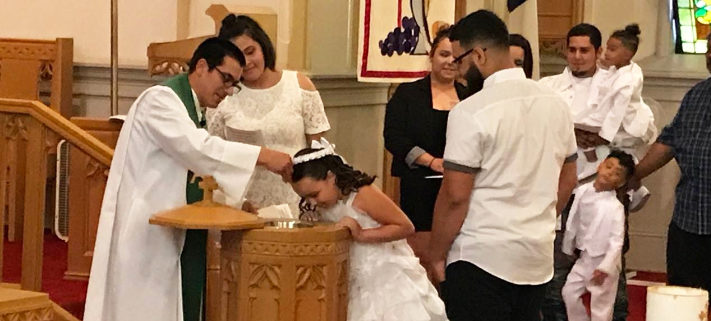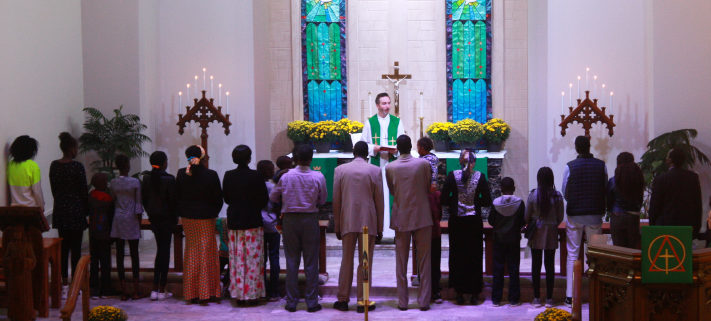One of Luther’s favorite things to preach about was Christmas—God made flesh to save us.
Nathaniel J. Biebert
Martin Luther and Christmas were like two peas in a pod. He called Christmas a “great festival,” a “beautiful festival,” a “lovely festival.” He called the Christmas story a “joyful, blessed history,” a “comforting, lovely account.” He composed three original Christmas hymns—Christian Worship 33, 38, and 53—including his famous 15-stanza hymn “From Heaven Above to Earth I Come.” In fact, Luther and Christmas have become so intertwined in many minds that when “Away in a Manger” was first published in the 1880s, it was falsely claimed that Luther had composed both text and tune for his children.
But what married Martin Luther to Christmas more than anything else was his preaching. Between 1514 and 1544, he preached at least 47 different Christmas sermons on Luke 2:1-20 alone, not to mention the Christmas sermons he preached on Matthew chapter 1, John chapter 1, and Isaiah chapter 9, and the Christmas sermons he prepared only for print. Just between 1527 and 1533, he preached six sermon series on Luke chapter 2, each of them three to five sermons long.
Luther himself tells us how he could do that and why he did: “[The account of Christ’s birth] is a rich history on which there are many sermons to preach” (Luther’s Works [WA], Vol. 29, p. 679). “By God’s grace we know almost all of this Gospel text quite well; on the other hand, we don’t know it at all. We know it well because we hear it and read it and sing it so often . . . and yet we know nothing. That is why we are moved by it only a little or not at all, and it does not go to our hearts and does not occupy us as it ought.” If we knew it well, we would always “have joy and delight from it” (WA, Vol. 23, p. 726).
Luther almost invariably began his sermons on Luke chapter 2 with “the history.” Jesus’ birth was not merely a cute story. “Notice the certainty in the statement of the evangelist [Luke] that the birth of Christ took place at the time of Emperor Augustus and when Cyrenius was governor of the Roman Empire in Syria” (LW, Vol. 52, p. 8). All the comfort we derive from the Christmas story is rooted in its historicity. “Is he here for the sake of the geese, cows, or pigs? He is a human. If he had wanted to help the pigs, he would have assumed the nature of a pig. . . . He has put on human nature; he was made the son of a virgin” (WA, Vol. 37, p. 236).
The fact that Mary had to give birth to Jesus in shameful circumstances was proof that Christ’s kingdom is not of this world, that he came to suffer and that those who bear his name must suffer, and that he came for a world of sinful rogues and wretches. The world either thinks little of the account or think that it’s ridiculous, but believers revel in every detail like the angels did.
Luther then moved on to the angel’s message to the shepherds, “the first and best preaching” in the New Testament (WA, Vol. 29, p. 656). Don’t miss it when the angel says that a Savior is born “to you.” “T-O Y-O-U [in Luke 2:11] should be written in large letters” (WA, Vol. 27, p. 493), yes, “in blazing letters” (WA, Vol. 37, p. 236). “For, if it is true that the child was born of the virgin and is mine, then I have no angry God and I must know and feel that there is nothing but laughter and joy in the heart of the Father and no sadness in my heart. For, if what the angel says is true, that he is our Lord and Savior, what can sin do against us?” (LW, Vol. 51, p. 216). The angel’s sermon is also proof that God communicates his grace and works saving faith through the proclamation of the gospel.
When Luther reached the song of the angel host, he divided it into three stanzas:
1) “Glory” belongs “to God in the highest,” not to our works or merit.
2) “Peace on earth” is the result of the Christ-child’s birth for those who believe he came to reconcile them with God.
3) When humans have this peace, then they also have “good will,” which Luther said he would rather translate as “delight” (WA, Vol. 49, p. 291).
From the example of the shepherds, Luther taught that faith in Christ produces good works. And good works are not limited to what is done in a monastery or in an official church-related position (after all, “the shepherds returned” to their flocks).
Luther simply could not get over the miracles of Christmas. It was miracle enough that God would stoop so far down as to assume human nature in the womb of the virgin. “But is even more miraculous that the Son of God . . . does this for the sake of the poor, condemned human race, to deliver them from the curse and the devil’s power and to restore them to their proper condition again” (WA, 10/3:432).
Perhaps this is all best summed up in a Christmas hymn that predated the Reformation and seems to have been Luther’s favorite. He quoted it at least five times in
his Christmas sermons and cited it as proof that the gospel was preserved even in the darkness of the pope’s false teaching:
For us today is born a child,
A perfect son so peerless,
Of Mary, fair maid undefiled,
To cheer mankind so cheerless.
Were he not born, we all had dwelled
In fear and fire, from God expelled—
Salvation’s ours forever!
To you, sweet Jesus, glory be
For sharing in humanity!
Let hell subdue us never! (Evangelical Lutheran Hymnary 131:2)
Nathaniel Biebert is pastor at Risen Savior, Austin, Texas.
As we celebrate the 500th anniversary of the Reformation, this is the final article in a 12-part series on our Lutheran heritage.
Want to read more of Luther’s Christmas sermons? Check out Biebert’s recently published English translation of Luther’s Christmas sermons on Isaiah 9:6.
Luther still speaks
In his book on the bondage of the will, Luther wrote, “What matter of more sacred importance can lie hidden in Scriptures now that the seals are broken, the stone is rolled from the sepulcher, and that greatest of all mysteries is brought to light: Christ, the Son of God made Man—God Triune and yet One, Christ, who suffered for us and will rule eternally? Are not these things known and sung in our very streets? Take Christ out of the Scriptures, and what else will you find in them?” (What Luther Says, Vol. 1, #437).
“Keep Christ in Christmas” urged the sign on the front lawn. Luther would agree, and so do we. At the center of our salvation lies the glorious teaching of God becoming man to save us. That little baby clothed in the diapers of poverty is a miracle of love.
Maybe we should also have yard signs that read “Keep Christ after Christmas.” The Bethlehem crib is only part of the story of our salvation. If the account were to end there, Jesus’ birth would still be a miracle, but worth nothing to us. That diapered holy child asleep on the hay must lead to the sin-laden one on the cross for whose seamless robe calloused soldiers cast their dice. Nor dare it end on that skull-shaped Good Friday knoll. An emptied borrowed Easter tomb and a “mission accomplished” Ascension complete the story of redemption.
Of course, we want to keep the Savior’s birth at the heart of our Christmas joy. But we surely don’t want to stop there. “Christ, the Son of God made Man . . . Christ, who suffered for us and will rule eternally” are things we know and will want to sing about all year long.
Richard Lauersdorf is a pastor at Good Shepherd, West Bend, Wisconsin.
Do you have a manuscript, idea, or story from your own life you’d like to share for use in Forward in Christ or on wels.net? Use our online form to share it to our editorial office for consideration.
Get inspirational stories, spiritual help, and synod news from Forward in Christ every month. Print and digital subscriptions are available from Northwestern Publishing House.
Author: Nathaniel J. Biebert & Richard E. Lauersdorf
Volume 104, Number 12
Issue: December 2017
Copyrighted by WELS Forward in Christ © 2021
Forward in Christ grants permission for any original article (not a reprint) to be printed for use in a WELS church, school, or organization, provided that it is distributed free and indicate Forward in Christ as the source. Images may not be reproduced except in the context of its article. Contact us







